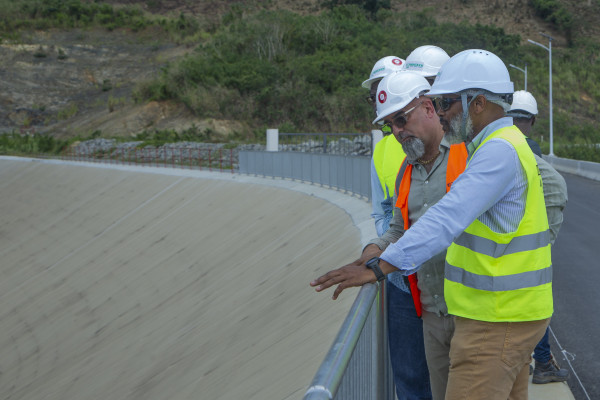Read in
During a recent three-day field visit to central Côte d’Ivoire, Joseph Ribeiro, the African Development Bank’s (www.AfDB.org) Deputy Director General for West Africa, expressed his satisfaction with the progress of two high-impact projects funded by the Bank Group that are set to revolutionize the country’s energy and agricultural landscapes.
Ribeiro’s delegation, comprising Blanche Kiniffo, Programme Officer for Côte d’Ivoire; Adama Moussa, Regional Sector Manager, Power Systems Operations; and project managers Rokaya Diallo and Mamadou Kane, visited the Singrobo-Ahouaty hydroelectric power station, and the Bélier Region Agro-Industrial Cluster Project (“2PAI-Bélier”).
The Singrobo-Ahouaty power station, located 150 km north of the capital, Abidjan, is on the brink of completion. “We’re more than 95 percent of the way through the project, and we should be finished soon so that we can feed the electricity into the national grid,” said Frédéric Roux, Project Director at IHE, the Ivorian investment company that is acting as a partner in the project.
The African Development Bank has contributed €40 million to the €174.3 million project. Key partners, such as the Africa Finance Corporation and DEG, also provided funding. It entails the construction of the 44-megawatt plant, notable for being the country’s first private producer of hydroelectricity. The plant is expected to play a crucial role in powering Côte d’Ivoire and supporting electricity exports to neighboring countries.
In Yamoussoukro, the Ivorian heartland, the Bélier Region Agro-Industrial Cluster Project (“2PAI-Bélier”), spanning 39 hectares of the industrial zone, is transforming the agricultural sector. This innovative agropole concept aims to stimulate agriculture, achieve food self-sufficiency, and boost exports through agro-processing, particularly by small and medium-sized enterprises.
The project, 80 percent financed by the African Development Bank with a $121 million investment, is 85.7 percent complete since its launch in 2018. Key accomplishments include:
Development of 1,241 hectares of rice-growing plots
Creation of 115 hectares of market garden areas
Restoration of 92 fishponds
Construction and renovation of four agricultural dams
Redevelopment of 542 km of agricultural access roads
The delegation witnessed the installation of a 40 MVA electrical transformer station designed to secure the agropark’s energy supply.
At the conclusion of the 72-hour trip, Ribeiro described the 44 megawatts Singrobo-Ahouaty hydroelectric power project as crucial in the country’s efforts to meet the energy needs of the booming economy and for export. “This demonstrates the Bank’s strong commitment. We’re happy with the progress of the work at Singrobo. There are still two or three things to fine-tune, but we hope that energy will soon be available for the national grid,” he said.
He said the seemingly successful outcome of the Bélier agropole cluster project is proof that Côte d’Ivoire’s future lies in agriculture.
He stated: “2PAI Bélier is producing tangible results that demonstrate that public-private partnership is essential in the agricultural sector to transform Ivorian agriculture. The vision of the Ivorian authorities and the African Development Bank is also vital. This project is in keeping with our “Feed Africa” strategy, with high-quality works and innovative technology being implemented and delivered on time.”
Ribeiro stressed that the success of these projects underscored the strong partnership between Cote d’Ivoire and the African Development Bank. “I think we’re making a difference,” he said, adding that the Bank Group fully backs Côte d’Ivoire’s National Development Plan for 2021-2025.
Distributed by APO Group on behalf of African Development Bank Group (AfDB).



